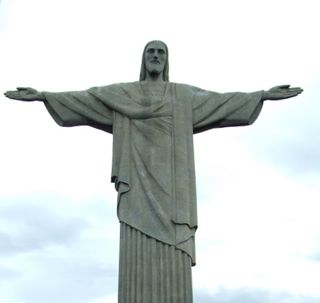Jesus Mortal |
|
 |
|||||
Lao Tzu The second most widely translated book, after the Christian bible, is the Taoist bible, the Tao Te Ching (“path of virtue book”). According to Chinese tradition, it was written long ago by the sage named Old Master (Lao Tzu). The Tao Te Ching extols the artless, the humble, the incomplete, and the imperfect. Old Master and Jesus are largely opposites. Lao Tzu is worshipped as a god and venerated as an ancestor. Post-Christians might find it odd to think that people could become objects of worship after death. But for the ancients, of course people could become gods worthy of worship after their deaths. The miraculous saints of Christianity are former mortals now gods. Jesus founded his life on God and his fatherly concern for his faithful, while Old Master’s cosmos is naturalistic with no humanlike god nor any particular concern for human needs. Jesus proclaimed an urgent, social eschatology, while the withdrawn Old Master described a timeless “way” operating largely outside the human sphere. For Jesus, the “way” was the name his followers chose for their community, a human, intentional “way” having little in common with Old Master’s cosmic, inhuman “way.” Jesus spoke. His medium was the rejoinder, the snappy phrase, the shocking allusion, working his audience, drawing them into his way of trusting the father. Old Master (perhaps a committee) wrote. His medium is the exalted thought and the philosophical insight. His audience never talks back. Jesus was a real man and even so he is worshiped as the one and only God. Old Master is apparently an invention, and he quite naturally is worshiped as a god.
Read comments or make a comment here. |
|||||
contents table of contents you're already looking at it introduction for the inquisitive reader biographical overview who he was and wasn't
afterlife not Jesus' concern animal sacrifice bloodless religion apocalypse did Jesus preach hellfire? baptism sin wash for Jesus and others beatitudes Jesus' words and others' words beloved disciple witness for the un-gospel bible scripture old and new bishop the unjesus body focus on the physical Buddha Jesus' close kin charity key Christian virtue and legacy of Jesus The Da Vinci Code secret (and false) messages divorce women's status dreams convenient literary device Elijah Jewish prophet with his own second coming equality ancient source of modern egalitarianism exorcist Jesus and demons failure reinterpreting Jesus as a failure faith from trust to blind belief father Jesus on titles of honor Francis of Assisi the most Christlike Christian Gandhi the 20th century's most Christly holy man Galilee Jesus' inauspicious homeland gentiles Jesus' inadvertent audience god how Jesus became god golden rule key to Jesus' success gospels competing accounts heaven from sky to spiritual home hell revenge fantasy humanism Jesus' legacy inerrant Christian treatment of scripture Thomas Jefferson ethics of Jesus Jewish guilt Christian libel John's gospel the un-gospel John the baptist, see John the washer John the washer Jesus' apocalyptic mentor Judaism libeled religion of Jesus kingdom of god what Jesus promised Lao Tzu poet of the cosmic way logos jesus as the word of god C. S. Lewis famous, flawed trilemma little drummer boy Luke beats Matthew logos Jesus as the divine word LORD Yahweh transitioning to the one god of all Luke's gospel the all-around best gospel Mark's gospel the gospel that lost its point Mary of Magdala women, visions, and sex massacre of the innocents bloodshed starts early Matthew's gospel best gospel for church reading Mormon, see Joseph Smith Moses Jewish lawgiver Muhammad a prophet who got it right mystery Orpheus and transubstantiation oppression origin of Jesus' compassion The Passion of the Christ Luke as buzzkill Paul revealer of the revealer private and public public Jesus and secret Christ relativism the secret power of the golden rule sacrifice Jesus' death and Christian sacrament Albert Schweitzer Jesus as a failure sheol dark pit of death show Jesus' deeds as put-ons slavery abolished by Jesus' efforts Joseph Smith flesh-and-blood Jesus Socrates secular Jesus son of god on close terms with the man upstairs soul, see body synoptics three gospels that agree temple center of Jewish religion trinity unifying and divisive doctrinre vision, see dreams Yahweh, see LORD Zoroaster Persian dualistic holy man
|
|||||